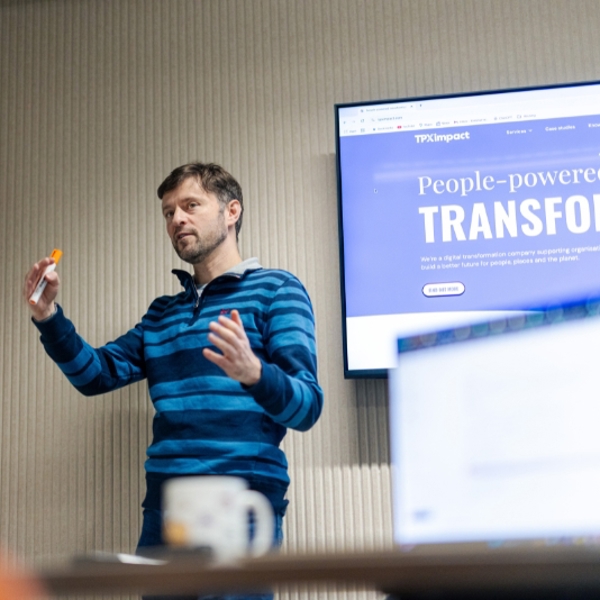Leading with Purpose
TPXimpact is a transformation company and Certified B Corporation™ governed by a mission to build a future where people, places and the planet can thrive. By combining expertise in design, data and technology, our leadership helps the public, private and third sectors deliver high-quality solutions that improve services and outcomes. We are committed to effective, sustainable governance that supports our people and clients in creating lasting impact for an ever-evolving world.
This page contains links to TPXimpact's management and financial information and has been designed to comply with the requirements of Rule 26 of the AIM Rules for Companies – ‘Company Information Disclosure’.


Board of Directors

Mark Smith
Non-Executive Chairman
Mark is a chartered accountant and co-founder of Chime Communications plc, where he served as CFO and COO for over 25 years. He currently holds multiple chair and non-executive roles, including at Holiday Extras, Merit Group plc, and Cognito Europe Limited. Appt: December 2018
Connect on LinkedIn
Björn Conway
Chief Executive Officer
Björn joined TPXimpact as CEO in 2022 to stabilise the business and drive a new strategic vision. With a background in professional services, he previously led EY’s UK Government and Public Sector team, doubling its size over five years, and has extensive experience in business transformation and consultancy. Appt: October 2022
Connect on LinkedIn
Henry Turcan
Non-Executive Director
Henry is a fund manager at Lombard Odier Asset Management (Europe) Limited. He has been advising and investing in UK companies for almost 30 years. Henry is being appointed as a representative of Lombard Odier, acting as discretionary investment manager or sub-adviser on behalf of certain funds and accounts managed by it, which hold 19.21% of the Company’s issued share capital. Appt: July 2025
Connect on LinkedIn
Christopher Sweetland
Non-Executive Director
A chartered accountant, Chris held senior financial roles at PepsiCo before joining WPP plc, where he served as Deputy Group Finance Director until 2016. He has extensive experience in operations, investor relations, and acquisitions and now holds multiple non-executive director roles, including at TPXimpact. Appt: December 2018
Connect on LinkedIn
Isabel Kelly
Non-Executive Director
Isabel is the founder of Profit with Purpose and co-founder of ESG-Experts, advising companies on social and environmental impact. With a background at Oxfam and Amnesty International, she later led global social impact initiatives as International Director at the Salesforce Foundation. Appt: December 2018
Connect on LinkedIn
Rachel Neaman
Senior Independent Director and Chair of Remuneration Committee
Rachel is a digital transformation leader with experience across the public, private, and not-for-profit sectors. She was the UK Dpt of Health’s first Chief Digital Officer and now advises executives and boards on digital strategy. She also holds governance roles at Birkbeck College and Digital Health.London and is a High-Risk Assurance Reviewer for the Cabinet Office’s IPA. Appt: October 2020
Connect on LinkedIn
Noel Douglas
Chief Financial Officer and Company Secretary
Noel joined TPXimpact as CFO to lead the financial and operational strategy of the business. With an extensive background in finance and commercial performance management from his senior finance positions at AND Digital and Endava PLC, where he accelerated digital transformation, integrated key acquisitions, and drove operational efficiency to support rapid growth. Appt: February 2025
Connect on LinkedIn
Company Information:
Name: TPXimpact Holdings PLC
Registered office: TPXimpact Holdings PLC, The Hickman, Second Floor, 2 Whitechapel Road, London, United Kingdom, E1 1EW.
Company Number: 10533096.
Registered in England and Wales.
TPXimpact Holdings plc shares are not traded, or admitted to be traded, on any exchanges or trading platforms other than the AIM market of the London Stock Exchange.
The Company is subject to the UK City Code on Takeover and Mergers. There are no restrictions on the transfer of the Company’s AIM securities.
10 Principles of Corporate Governance
We’re committed to high standards of governance, ensuring transparency, accountability, and long-term value creation. Our corporate governance framework is built on the 10 principles of the QCA Code*:
*Compliance with the QCA code last reviewed in August 2025, alongside the publication of our annual report.
Majority shareholders
The Company has 95,184,509 Ordinary Shares in issue.
The Company does not hold any Ordinary Shares in treasury. Insofar as TPXimpact Holdings plc is aware, the percentage of shares not in public hands is 32%.
| Shareholder | Number of Ordinary Shares | Percentage of Holding |
| Lombard Odier Investment Managers | 17,699,704 | 18.60 |
| Mr Erick Grant Harris | 9,254,436 | 9.72 |
| Dowgate Capital | 8,274,707 | 8.69 |
| Canaccord Genuity Wealth Management (Inst) | 6,950,000 | 7.30 |
| Interactive Investor | 4,142,855 | 4.35 |
| Individuals | 3,755,857 | 3.95 |
| Octopus Investments | 3,705,755 | 3.89 |
| Mr Oliver Rigby | 2,998,854 | 3.15 |
Note: The securities of TPXimpact are listed and traded on the LSE AIM. They are not admitted or traded on any other exchanges.
The Company is subject to the UK City Code on Takeovers and Mergers. Further details are set out on page 33 of the Admission Document
Page last modified on: 18 February 2026
Financial Calendar:
2026 Events
| FY26 Year-end | 31 March 2026 |
| Annual General Meeting | September 2026 |
| FY27 Half Year End | 30 September 2026 |
Reports & results
Please find a link to a copy of our:
Reports & Results: https://www.tpximpact.com/investor-relations/finance-regulations/reports-results
Articles & Policies: https://www.tpximpact.com/investor-relations/finance-regulations/articles-policies
Explore more

Our story & mission
Discover the beliefs and values that shape everything we do, from our founding vision to our day-to-day operations.
Read our story
Why invest for impact?
Learn why TPXimpact is positioned for long-term growth in a rapidly expanding digital transformation market while remaining committed to social value and environmental stewardship.
See investment case
Financials & regulatory information
Access our most recent reports and results, along with essential policies and disclosures that reflect our commitment to transparency.
View financials
